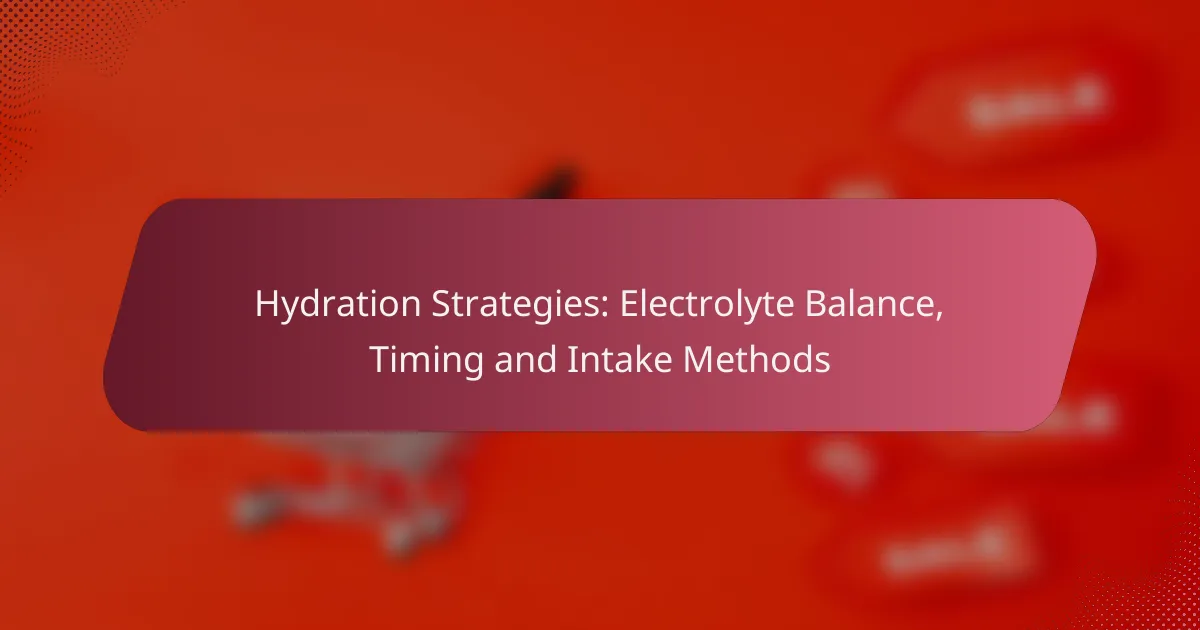Hydration strategies are essential for athletes, particularly in Ireland, where effective fluid intake, electrolyte supplementation, and timing can significantly impact performance. Maintaining electrolyte balance is crucial for regulating fluid movement in the body, ensuring optimal hydration and function. Various methods, such as sports drinks, tablets, and natural foods, offer tailored approaches to meet individual hydration needs.
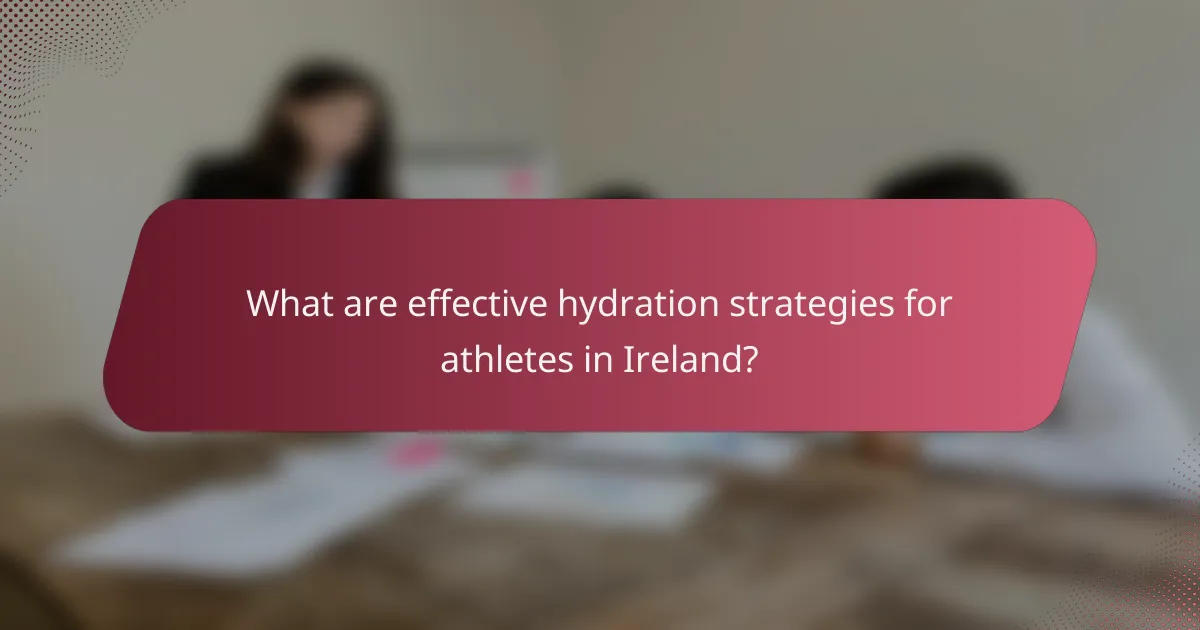
What are effective hydration strategies for athletes in Ireland?
Effective hydration strategies for athletes in Ireland focus on increased fluid intake, electrolyte supplementation, and proper timing of hydration relative to exercise. These strategies help maintain optimal performance and prevent dehydration during training and competition.
Increased fluid intake
Increased fluid intake is crucial for athletes to replace lost fluids and maintain hydration levels. Athletes should aim to drink water consistently throughout the day, with a focus on consuming around 2-3 liters daily, depending on activity levels and environmental conditions.
During exercise, especially in warmer weather, athletes should consider drinking an additional 500-1000 ml of water per hour. Carrying a water bottle during training sessions can serve as a reminder to hydrate regularly.
Electrolyte supplementation
Electrolyte supplementation helps replenish essential minerals lost through sweat, such as sodium, potassium, and magnesium. Athletes in Ireland may benefit from sports drinks or electrolyte tablets, especially during prolonged or intense workouts.
When choosing electrolyte products, look for those with a balanced ratio of sodium to potassium. A common recommendation is to consume 500-700 mg of sodium per liter of fluid, particularly during endurance events lasting over an hour.
Timing hydration before, during, and after exercise
Timing hydration is essential for maximizing performance and recovery. Athletes should aim to drink water or electrolyte beverages about 2-3 hours before exercise to ensure proper hydration levels.
During exercise, sipping on fluids every 15-20 minutes can help maintain hydration. After workouts, rehydrating with water and electrolytes within 30 minutes is crucial for recovery. A good rule of thumb is to drink 1.5 times the amount of fluid lost during exercise to fully rehydrate.
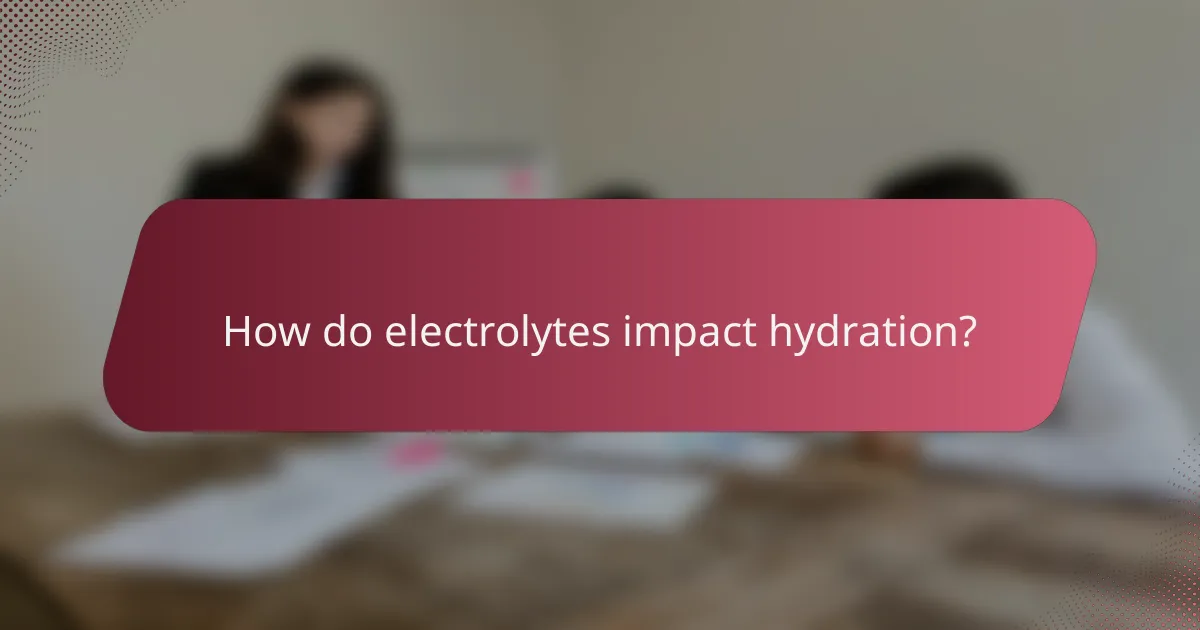
How do electrolytes impact hydration?
Electrolytes play a crucial role in hydration by helping to regulate fluid balance in the body. They facilitate the movement of water in and out of cells, ensuring that tissues remain adequately hydrated and function properly.
Role of sodium in fluid retention
Sodium is a key electrolyte that helps maintain fluid balance by promoting water retention in the body. When sodium levels are adequate, it signals the kidneys to retain water, preventing dehydration.
However, excessive sodium intake can lead to fluid retention and increased blood pressure. It’s important to balance sodium consumption, aiming for a daily intake of about 2,300 mg for most adults, while considering individual health conditions.
Importance of potassium for muscle function
Potassium is vital for muscle function and overall hydration. It helps regulate nerve signals and muscle contractions, making it essential for physical performance and recovery.
Adequate potassium levels can prevent muscle cramps and weakness, especially during intense exercise. Aim for a daily intake of around 3,500 to 4,700 mg, which can be achieved through foods like bananas, oranges, and leafy greens.
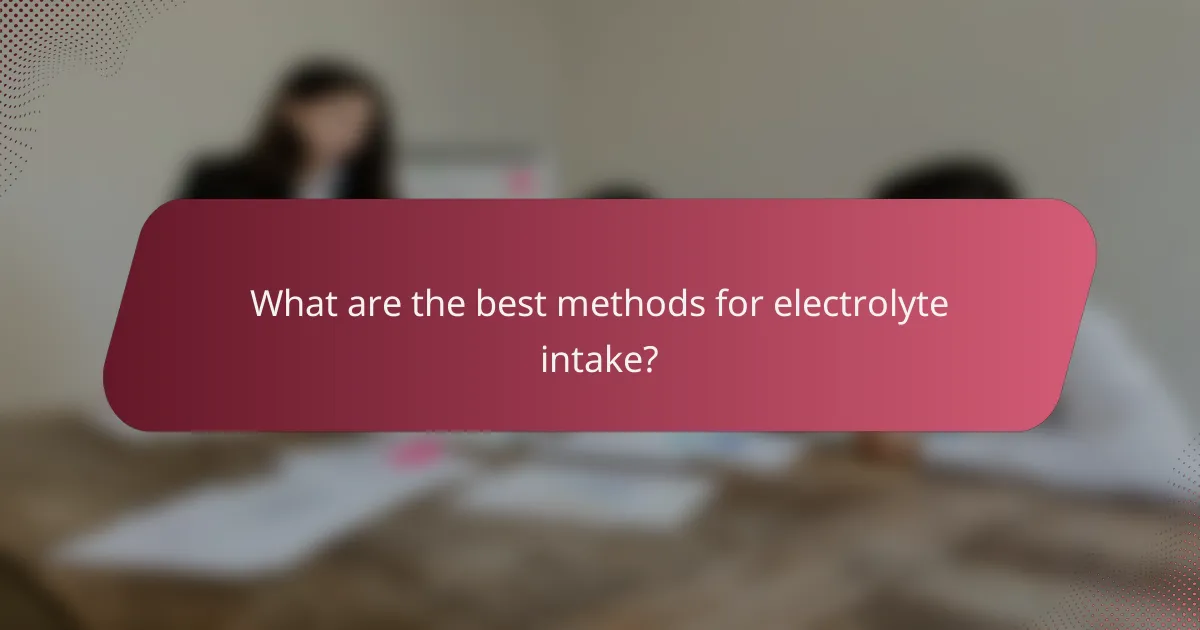
What are the best methods for electrolyte intake?
The best methods for electrolyte intake include consuming sports drinks, electrolyte tablets or powders, and natural food sources. Each method has its own advantages and considerations, allowing individuals to choose based on their hydration needs and preferences.
Sports drinks for hydration
Sports drinks are specifically formulated to replenish electrolytes lost during intense physical activity. They typically contain sodium, potassium, and carbohydrates, which help maintain hydration and energy levels. Look for drinks with a balanced electrolyte profile, especially during prolonged exercise or in hot conditions.
When selecting a sports drink, consider the sugar content. Some options may have high sugar levels, which can lead to energy crashes. Aim for drinks that provide around 6-8% carbohydrates for optimal hydration without excessive sugar intake.
Electrolyte tablets and powders
Electrolyte tablets and powders offer a convenient way to manage electrolyte intake, especially for those who prefer not to consume sugary drinks. These products can be mixed with water and are often low in calories. They typically contain essential electrolytes like sodium, potassium, magnesium, and calcium.
When using electrolyte tablets or powders, follow the recommended dosage to avoid excessive intake. Many products suggest dissolving one tablet or scoop in about 500 mL of water, but always check the label for specific instructions.
Natural food sources of electrolytes
Natural food sources are an excellent way to maintain electrolyte balance through a balanced diet. Foods rich in electrolytes include bananas, avocados, spinach, and yogurt, which provide potassium, magnesium, and calcium. Incorporating a variety of these foods can help meet daily electrolyte needs without relying solely on supplements.
For a practical approach, aim to include at least one or two electrolyte-rich foods in each meal. This can help ensure adequate intake throughout the day, especially if you are physically active or live in a hot climate.
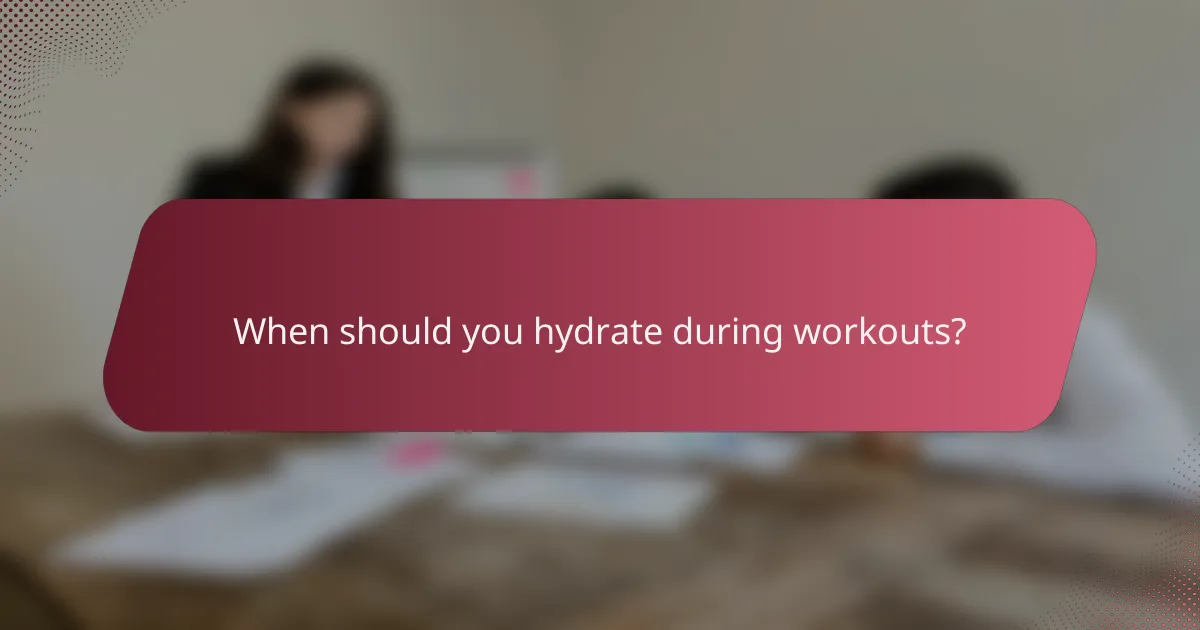
When should you hydrate during workouts?
You should hydrate before, during, and after workouts to maintain optimal performance and prevent dehydration. Timing your hydration is crucial, as it helps to balance electrolyte levels and supports endurance throughout your exercise routine.
Pre-workout hydration recommendations
Hydrating before a workout is essential for preparing your body. Aim to drink about 500 to 600 milliliters of water or a sports drink at least two hours prior to exercise. This allows your body to absorb the fluids and helps maintain electrolyte balance.
Consider consuming an additional 200 to 300 milliliters about 20 to 30 minutes before starting your workout. This final boost can enhance your hydration levels and improve performance, especially in high-intensity activities.
Hydration during endurance events
During endurance events, it’s vital to stay hydrated to sustain energy levels and performance. Aim to drink approximately 200 to 300 milliliters of fluid every 15 to 20 minutes, adjusting based on temperature and intensity. Sports drinks can be beneficial as they provide electrolytes lost through sweat.
Monitor your body’s signals; if you feel thirsty or fatigued, increase your fluid intake. Using a hydration pack or portable water bottles can facilitate easy access to fluids during long sessions.
Post-workout recovery hydration
Post-workout hydration is critical for recovery and restoring lost fluids. Drink at least 500 to 700 milliliters of water or a recovery drink within 30 minutes after exercising. This helps to replenish fluids and electrolytes that were depleted during your workout.
To assess your hydration status, consider weighing yourself before and after exercise. For every kilogram lost, aim to drink about 1.5 liters of fluid to effectively rehydrate. Incorporating foods with high water content, such as fruits and vegetables, can also aid in recovery hydration.

What factors influence hydration needs in Ireland?
Hydration needs in Ireland are influenced by various factors including climate, exercise intensity, and duration. Understanding these elements can help individuals maintain optimal hydration levels for health and performance.
Climate and temperature effects
The Irish climate is generally mild, but it can be quite humid, which affects hydration needs. During warmer months, even moderate temperatures can lead to increased perspiration, necessitating higher fluid intake to replace lost fluids.
It’s essential to monitor hydration levels, especially during heatwaves or when participating in outdoor activities. A good rule of thumb is to drink water regularly throughout the day, aiming for at least 2-3 liters, adjusting based on activity and temperature.
Intensity and duration of exercise
Exercise intensity and duration significantly impact hydration requirements. During high-intensity workouts or prolonged activities, the body loses fluids rapidly through sweat, increasing the need for water and electrolytes.
For activities lasting over an hour, consider consuming electrolyte-rich drinks to replenish sodium and potassium levels. A practical approach is to drink about 500-750 ml of fluid per hour during intense exercise, adjusting based on personal sweat rates and environmental conditions.

What are the signs of dehydration?
Signs of dehydration include a range of physical symptoms and changes in hydration status. Recognizing these indicators is crucial for maintaining optimal health and performance.
Physical symptoms to watch for
Common physical symptoms of dehydration include dry mouth, fatigue, dizziness, and dark yellow urine. In more severe cases, individuals may experience rapid heartbeat, confusion, or fainting.
It’s essential to pay attention to thirst, as it is often the body’s first signal that hydration is needed. Additionally, skin elasticity can be a quick check; pinch the skin on the back of your hand and see if it quickly returns to normal. If it remains tented, this may indicate dehydration.
How to monitor hydration status
Monitoring hydration status can be done through simple methods like observing urine color and frequency. Ideally, urine should be light yellow and produced regularly throughout the day.
Another effective approach is to track daily fluid intake, aiming for about 2 to 3 liters for most adults, depending on activity level and climate. Keeping a hydration log can help identify patterns and ensure adequate fluid consumption.

How can you maintain electrolyte balance?
Maintaining electrolyte balance involves ensuring adequate intake of essential minerals like sodium, potassium, calcium, and magnesium. This balance is crucial for hydration, muscle function, and overall health.
Daily intake recommendations
The daily intake of electrolytes can vary based on factors such as age, sex, activity level, and climate. Generally, adults should aim for around 2,300 mg of sodium, 4,700 mg of potassium, and 1,000 mg of calcium daily.
For athletes or those engaging in intense physical activity, these needs may increase significantly. It’s advisable to monitor your electrolyte levels, especially during prolonged exercise or in hot weather, to prevent deficiencies.
- Sodium: 2,300 mg for general health; up to 3,000 mg for athletes.
- Potassium: 4,700 mg for adults; higher for active individuals.
- Calcium: 1,000 mg for most adults; 1,200 mg for women over 50.
